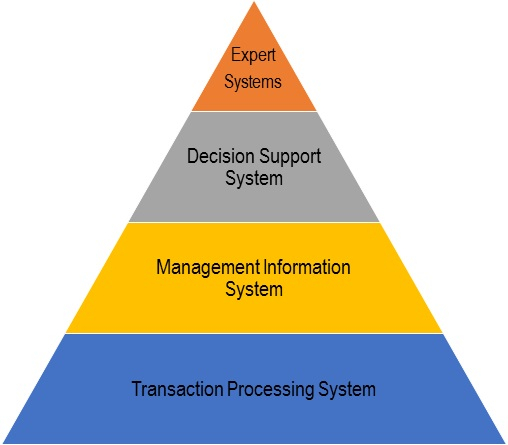
 Data Structure
Data Structure Networking
Networking RDBMS
RDBMS Operating System
Operating System Java
Java MS Excel
MS Excel iOS
iOS HTML
HTML CSS
CSS Android
Android Python
Python C Programming
C Programming C++
C++ C#
C# MongoDB
MongoDB MySQL
MySQL Javascript
Javascript PHP
PHP
- Selected Reading
- UPSC IAS Exams Notes
- Developer's Best Practices
- Questions and Answers
- Effective Resume Writing
- HR Interview Questions
- Computer Glossary
- Who is Who
Types of Information Systems
What is an Information System?
A formal, sociotechnical organizational system designed to gather, process, store, and disseminate information is known as an information system (IS). Information systems comprise four components from a sociotechnical standpoint − task, people, structure (or roles), and technology.
Information systems consist of members that gather, store, and process data, with the data being utilized to give information, add to knowledge and create digital products that aid decision-making.
Organizational levels, data mode, processing, system objectives, and type of assistance given are all used to classify information systems.
Types of Information System
The following images shows the types of Information Systems −

Transaction Processing System (TPS)
The term "transaction processing system" refers to an information system that processes data arising from business transactions.
The goal of a Transaction Processing System is to offer transactions so that data may be updated and reports can be generated, i.e., to do storekeeping.
Batch processing and online transaction processing are the two methods used to complete the transaction.
Examples include a billing system, a payroll system, and a stock control system, etc.
Management Information System (MIS)
The purpose of a Management Information System is to turn relatively raw data available through a Transaction Processing System into a summarised and aggregated form for the manager, generally in the form of a report. Middle management and operational supervisors are likely to use the reports.
In MIS, several distinct types of reports are generated. A summary report, on-demand report, ad-hoc reports, and an exception report are among the reports available.
Examples include Sales Management Systems and Human Resource Management Systems.
Decision Support System (DSS)
In a semi-structured or unstructured environment, a Choice Support System is an interactive information system that gives information, models, and data manipulation tools to assist in making a decision.
The end-user is more active in producing DSS than a MIS since it includes tools and strategies to assist in obtaining relevant information and analyzing possibilities and alternatives.
Examples include Financial Planning Systems and Bank Loan Management Systems.
Experts Systems
Experts Systems include knowledge to assist management in identifying and fixing problems. These systems are based on artificial intelligence research concepts.
Experts Systems is an information system that is built on knowledge. It acts as an expert counsellor to consumers by utilizing its expertise in a particular area.
An expert system's components include a knowledgebase and software modules. These modules make inferences based on knowledge and respond to a user's query.

